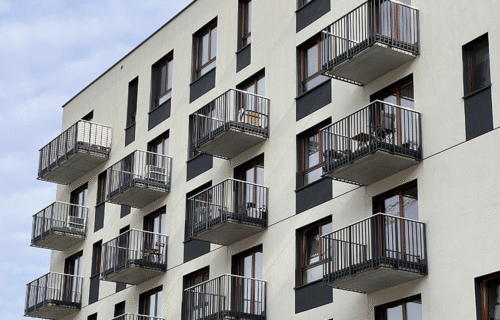The supply of new apartments in the Czech capital continues to stagnate despite developer pipelines holding tens of thousands of planned units. Market data from leading residential developers shows that Prague currently has roughly 5,700 new-build apartments available for sale, a level that has changed little over the past year.
The distribution of units remains uneven. Central districts, particularly Prague 1 and Prague 2, continue to show the most limited availability, while Prague 9 accounts for the largest share of the market and remains the city’s most active development area. The district has seen the transformation of several former industrial zones and today represents one of the main hubs for new residential projects.
Market activity continues to be dominated by 2+kk units, which represent around 40% of both supply and transactions. Developers report a longer-term decline in the share of studio apartments, which has fallen to below one-fifth of the market as buyers prioritise slightly larger units with more flexible layouts.
Developers are adjusting to these trends by adding projects aimed at smaller, more affordable units. Central Group recently launched another phase of its Harfa Living development, designed to meet ongoing demand from both owner-occupiers and private investors seeking compact apartments with lower entry prices.
The key challenge facing the market remains the slow pace of permitting in the capital. According to publicly available development data, less than 4,000 apartments were approved in the first three quarters of 2025, leaving the city far from meeting the estimated annual demand of around 10,000 units. Approvals recorded in the third quarter were among the lowest in recent years, continuing a long-running trend of administrative delays.
Despite continued year-on-year growth in the Czech construction sector as a whole, Prague’s approval pipeline has increasingly failed to keep pace with demand. Developers warn that prolonged delays, combined with ongoing shortages of skilled labour and limited availability of raw materials, may further constrain future construction activity.
The newly formed government has identified housing as a strategic national priority and has signalled its intention to accelerate the approval of residential projects. Planned measures include wider implementation of digitised permitting procedures, reducing regulatory overlap, and classifying key housing developments as strategic projects to speed up their processing.
Industry representatives note that if these measures are implemented effectively, they could help unlock a significant portion of the residential pipeline. Developers collectively hold planning projects amounting to over 100,000 units that could enter the market more quickly under a streamlined approval system.
Only a sustained increase in the pace of new construction, combined with a more efficient permitting process, is expected to ease the longstanding pressure on housing availability and affordability in the capital.
